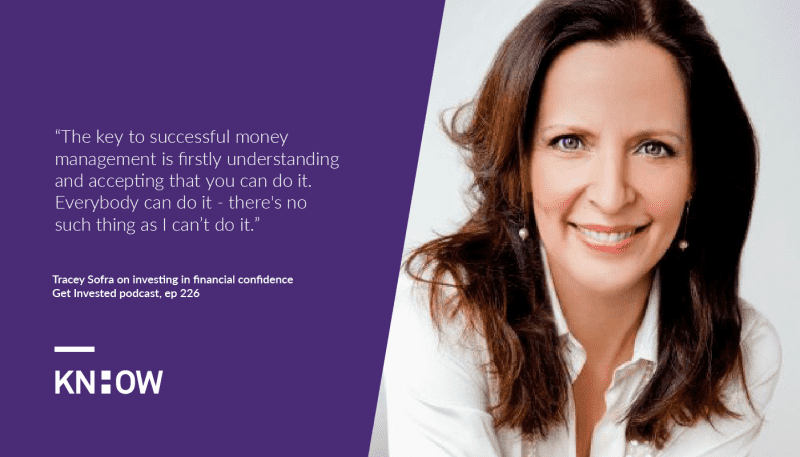Financial advisor Tracey Sofra says financial confidence comes from shifting your mindset and getting more control over your cash flow.
Finances are often a stress point, but Tracey Sofra says your relationship with money doesn’t have to be this way.
Tracey is Australia’s leading Financial Advisor specialising in Women’s Financial Confidence, along with also being a business leader, wealth mentor, author and keynote speaker.
She told KnowHow founder Bushy Martin on the Get Invested podcast that financial success and confidence comes from shifting your mindset and behaviours.
And the first major misconception to break is that people need a huge amount of money to start investing.
“I feel like people predominantly think they need a lump sum of money to invest. They miss the whole point of it’s a little bit over a long period of time. And that’s what I mean by that’s how simple it actually is. It’s lunch money, it can be $20 a week or $50 a week. You’ve just got to start with something,” Tracey said.
“But we’re still not told. It’s not common knowledge that your best friend is time. Why? Because there’s a thing called compound. And compound requires time. And so when we do the numbers on that, somebody that throws double the amount of money with less time will not catch up to the person that started earlier. It’s impossible. So, you know, that’s the biggest mistake people make. They just think, ‘oh it’s not going to make a difference’.Well, it’s going to make a massive difference.”
Tracey said another limitation is that people will hold off on investing until they’ve paid off their debts.
“I’ve heard a number of times people say once I’ve paid off my home loan, then I’ll start to invest. But you can’t do that. You can’t afford to do that. You’ve got to get up close and personal. You’ve got to get really creative with your cash flow. By the time you pay off the home loan, it’s too late,” she warned.
“I could count on my hand the amount of clients I’ve worked with over the last 30 odd years that are great with their cash flow and that can actually knock it off in 10, 12, maybe 15 years, and then invest. Imagine losing ten years out of an investment cycle – that’s massive.”
But to take these actions requires financial confidence and a good relationship with money. So to have greater confidence with your money management choices, Tracey recommended embracing her ‘EMPOWER’ approach and methodology.
But before you take on these steps, Tracey said you need to believe in yourself and your abilities.
“The key is firstly understanding and accepting that you can do it. Everybody can do it. There’s no such thing as a conduit. That just doesn’t exist. Secondly, personal responsibility. We are responsible for ourselves, make no mistake about that. So we have to step up for ourselves for we are all responsible for ourselves,” she said.
Tracey explained that the first two principles of EMPOWER – experience/environment and mindset -are about you, the individual.
“So E is for your experience and environment. What is your environment? What did you experience? What is your mindset around money? And then the M is drilling into their mindset, which is about where they came from, what they wanted, what their values were, how we were going to get them there, and what their future self was. So the E and the M have nothing to do with investments. We’re not even talking about any of that at all,” she said.
“It’s about doing the groundwork, because I believe if you don’t do that, all the skills in the world mean nothing. Why? Because you can’t connect it back to all of the stuff that’s within you. So all the skills in the world aren’t going to matter at all if you can’t connect it back to yourself.”
The following principles then focus on your finances and steps to building wealth.
“The P is for plan investments. The O is for opportunities, and the opportunity is all about debt and leverage. The W is for wealth protection, where we talk about protecting what you’ve worked so hard for because that’s missed often quite totally because you work all your life, you build wealth and then you have an insurer, and if you haven’t done estate planning, it ends up in the wrong hands,” Tracey revealed.
“E is for execution. So you get yourself right, you learn the skills and you do nothing – what’s the point? So it’s the execution plan – take all of that and execute it. And R is for review and reform. It’s continuous improvement. Stay within the group of like-minded people and continue to do that. Don’t just execute and never do it again. It is a lifelong journey that you continue to do.”
Listen to the full interview here.
Want to Know How you can build wealth with the help of leading, qualified experts? Talk to the team at KnowHow, now.




